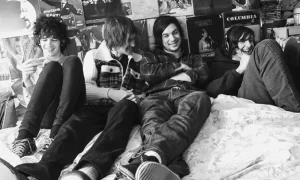Transcript
OPENING: Clips from news coverage + Instrumental intro of song
- NEWS TAPE – Alleged Gunman Elliot Rodger’s Chilling Manifesto [1:42-1:46]
Nobody would do the types of things that happened last night unless there was some form of mental illness
- NEWS TAPE – Oregon College Shooting [0:05-0:12]
And Roseburg like Columbine, Newtown, so many other towns, another American town shattered by mass shooting
- NEWS TAPE – Alleged Gunman Elliot Rodger’s Chilling Manifesto [1:02-1:18]
And his most repeated grievance being rejected by women. “Girls gave their affection and sex and love to other men but never to me. I’m 22 years old and I’m still a virgin.”
- SONG TAPE – First verse
Somebody running through the field
Somebody should’ve stayed home
Somebody picking out the body of somebody they were getting to know
Somebody lacking in desire
The type you just don’t fuck
A supreme gentleman with a gun in his hand
L-l-l-looking for somebody to love
- NARRATOR: The social phenomenon of mass shootings, specifically in the United States, has become more and more relevant to our contemporary culture. Matty Healy, the lead vocalist and songwriter of the British pop rock band The 1975, attempts to tackle this subject from an outsider’s perspective in the song “Looking For Somebody (To Love)”.
- SONG TAPE – Third verse
Oh, they ran, oh, they ran, should have seen how they ran
When I was looking for somebody to love
You should have seen it, man, I was all, “Bang, bang, bang, bang”
Looking for somebody to love
- NARRATOR: The 1975 was formed when all four band members (Matty Healy, Ross MacDonald, Adam Hann, and George Daniel) met at Wilmslow High School in Cheshire, England. Healy has often credited his childhood friends with keeping him grounded despite massive success and helping him through tough times, such as his heroin addiction around the time their third studio album, A Brief Inquiry Into Online Relationships, was released.
- INTERVIEW – Matty Healy: ‘Art, sex, drugs, religion. It’s just about losing yourself’ | British GQ [22:09-22:25]
Regardless of whether it’s for good or bad or whatever, our desire for the consumption of media and culture has accelerated. Mine has. It’s not that I’m trying to keep up with some consumer market, it just feels like the thing to do.
- NARRATOR: In this interview with British GQ, Healy explains his unique approach to songwriting and why so many of the band’s songs touch on modern themes. Since the release of their debut self-titled album, The 1975 has been known for singing about changing social dynamics, atheism, and online dating, just to name a few.
- SONG (If You’re Too Shy (Let Me Know)) – Third verse
Maybe I would like you better if you took off your clothes
I’m not playing with you, baby
I think that you should give it a go
- NARRATOR: Just a quick Google search will yield absurd song titles that just scream 21st century, such as “Jesus Christ 2005 God Bless America”, “M.O.N.E.Y.”, and “The Man Who Married A Robot”.
- SONG (The Man Who Married A Robot) – Second verse
One day, the man, whose name was @SnowflakeSmasher86
Turned to his friend, the internet, and he said, “Internet, do you love me?”
The internet looked at him and said, “Yes”
- NARRATOR: I want to stress how extremely nuanced and complicated of an issue mass shootings are. There are many factors to examine, such as American gun culture and the fairly new clique of “involuntary celibate” men, more commonly referred to as incels.
- SCHOLARLY SOURCE – Incel Radical Milieu and External Locus of Control
From a historical perspective, the first online incel forums were used to create a sense of community and to fill emotional needs. Today, however, older and less violent groups are not as relevant as before and membership in the more aggressive groups is becoming increasingly prevalent.
- NARRATOR: That was an excerpt from an article by Sara Brzuszkiewicz from the International Centre for Counter-Terrorism, read by my friend Riley. In it, the origins and concept of incel culture is explained. Incel culture was started to give support to men who were unsuccessful romantically, and while many of the community’s core beliefs were misogynistic and problematic, the encouragement and execution of physical violence did not start until fairly recently.
- SCHOLARLY SOURCE – Incel Radical Milieu and External Locus of Control
Overwrought digital threats and confrontational online rhetoric are nearly as old as the Internet itself. Posters on 4chan/b/’s more transgressive threads regularly claim that they are about to do terrible things to themselves and others.
- NARRATOR: That was from an article by the same author from The Baffler magazine, read by my friend Julianna. When a disturbing post of a woman’s dead body was put on an incel website, it led to David Michael Kalac’s arrest for the murder of his girlfriend. Elliot Rodger, whose voice we heard in the opening news clips, posted his incel manifesto online before killing six people and injuring 14 others in Isla Vista, California. Did these men get inspiration from those who came before them after seeing what they were posting on the internet?
- SONG TAPE – Second verse
“You gotta show me how to push
If you don’t want a shove”
Are the words of a young man already damned
L-l-l-looking for somebody to love
- NARRATOR: “Looking For Somebody (To Love)” alludes to the connection between guns, violence, and incels. It generally is the story of a young man who is looking for romance, not receiving it, and therefore resorting to violence. But this also raises questions about the incel community, and the language we use to discuss such subjects.
- JOURNALISTIC SOURCE – The 1975’s Matty Healy Prefers Writing Lyrics He’s Afraid Of
It’s very easy, and maybe fair, to demonize some incel dressed as the Joker who goes and fucking shoots up a school, right? […] What I’m saying is that if the only vocabulary that we give young men to be assertive is one of such destruction and domination and violence, then a toxic masculinity, in some forms, normally in underfunded parts of countries and forgotten parts of countries, is maybe an inevitability.
- NARRATOR: In an interview with Justin Curto for Vulture, read by my friend Ashleigh. Healy elaborates on his intended meaning behind the song. And while he isn’t condoning mass shooters by any means, he also understands that the current crisis of masculinity does stem from rage and aggression. And if that is all little boys are told is acceptable for them as males, then what should we expect when they inevitably display those behaviors we’ve instilled into them? Are they “already damned” as the lyrics of the song might suggest?
- INTERVIEW – Matty Healy from The 1975 on exploring his sexuality. [0:48-0:53)
Healy: I’m not exactly the most manly man in the world.
O’Loughlin: Coming from the dude wearing a woman’s blouse.
Healy: Exactly.
- NARRATOR: Healy has always been eccentric and effeminate, bringing up questions about his own sexuality and masculinity. With his gender expression constantly being called into question, Healy’s own unique brand of masculinity connects to “Looking For Somebody (To Love)”, in the way that it explores exactly which traits we associate with masculinity, and why certain ones are more socially acceptable than others.
- SONG TAPE – Second verse
I wanna show him he’s a bitch
I wanna fuck him up good
I wanna smash the competition, go and kill it like a man should
- NARRATOR: This second verse of the song takes a closer look at toxic masculinity and the competition it breeds. The use of the derogatory word “bitch” to describe a weaker man and the phrase “like a man should” gives insight into what our modern conceptions of true masculinity are. To be a real man is to be aggressive and cutthroat.
- JOURNALISTIC SOURCE – Why Does the U.S. Have So Many Mass Shootings? Research Is Clear: Guns.
Americans make up about 4.4 percent of the global population but own 42 percent of the world’s guns. From 1966 to 2012, 31 percent of the gunmen in mass shootings worldwide were American, according to a 2015 study by Adam Lankford, a professor at the University of Alabama.
- NARRATOR: This statistic comes from a New York Times article by Max Fisher and Josh Keller, read by my friend Madi. Is it any wonder that the US has such a high rate of mass shootings, then? If the aforementioned values of brutality and use of force are ingrained in young boys, why are we shocked when they grow up with access to weapons of mass destruction and end up using those tools for evil?
- JOURNALISTIC SOURCE – Why Does the U.S. Have So Many Mass Shootings? Research Is Clear: Guns.
If mental health made the difference, then data would show that Americans have more mental health problems than do people in other countries with fewer mass shootings. But the mental health care spending rate in the United States, the number of mental health professionals per capita and the rate of severe mental disorders are all in line with those of other wealthy countries.
- NARRATOR: This excerpt comes from the same article, and addresses another potential cultural influence on high mass shooting rates – mental health issues. There has been a lot of speculation on this aspect of the subject over the years, and for a while many saw mental illness as a prerequisite to mass shootings. However, the New York Times article ends that debate, holding firmly that it is American gun culture, not mental health issues or inadequate mental health services, that fuels the fire.
- SONG TAPE – Fourth verse
Somebody lying on the field
Somebody crying on the phone
Somebody picking up the body of somebody they were getting to know
Maybe we’re lacking in desire
Maybe it’s just all fucked
But the boy with the plan and the gun in his hand
Was l-l-looking for somebody to love
- NARRATOR: “Looking For Somebody (To Love)” at its very core is a story about love, according to Healy. A young man is looking for somebody to love, but cannot find it. What occurs next is an examination of the external factors that influence his decision to shoot up a school. The song has received criticism for humanizing mass shooters and even potentially empathizing with them. But I disagree with this, and think that in order to diagnose the real issue, we cannot continue to glaze over certain elements that make us uncomfortable or force us to confront our humanity. “Looking For Somebody (To Love)” functions as a protest song because of the way it calls the listener to look at a social problem from a different perspective than they had before.





Leave a Reply